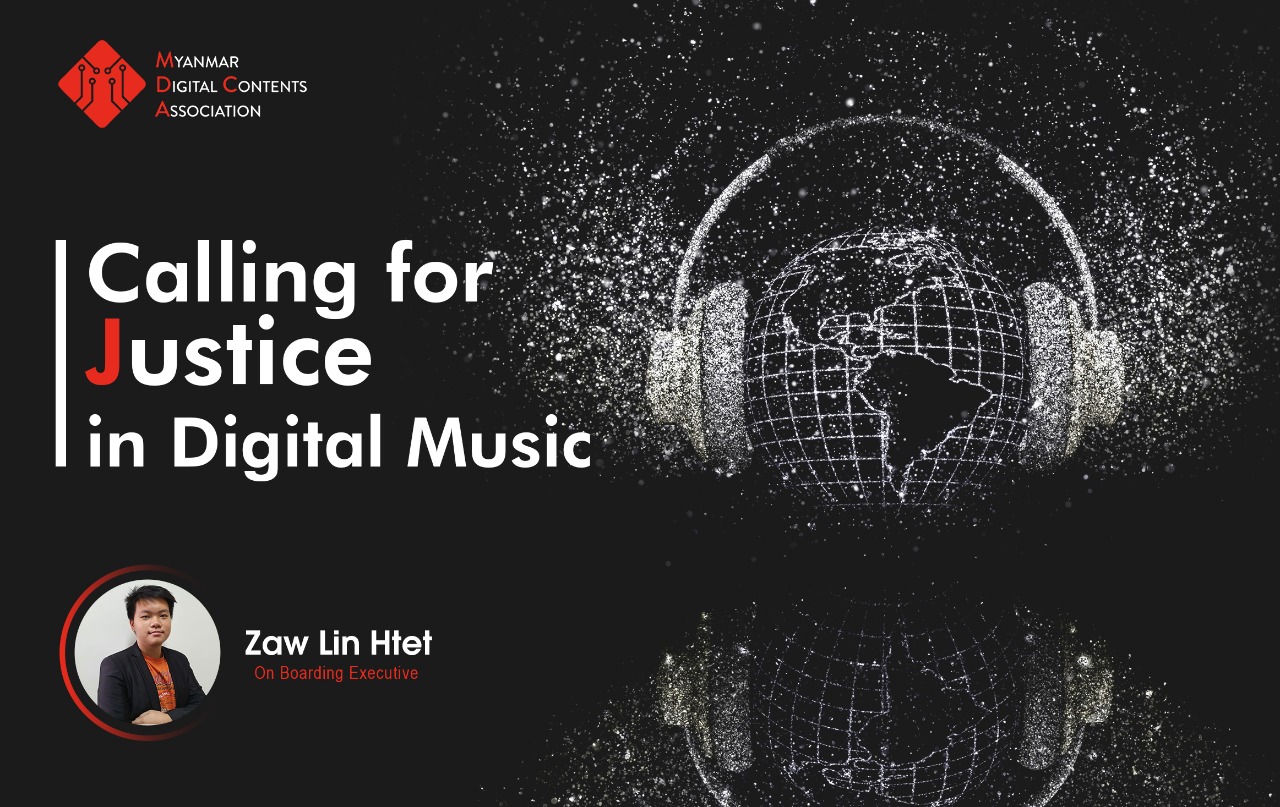
"Calling for Justice in Digital Music"
Just how it is so easy to listen to your favorite songs on the tip of your fingers, it is undeniable how almost everyone can now effortlessly choose any song on any platform and listen to it anywhere at any time with just a device in their hands. Nevertheless, it is a controversial issue among the ecosystem whether the real value of the creators of a song is being appreciated or oblivious. Is it high time that the obstacles in the Digital Music Content Ecosystem ought to be more aware of and be taken measures against so that the ecosystem can regulate better with less barriers?
Myanmar is currently in a developing stage in terms of Digital Development, meaning the majority are still digitally illiterate. This actually leads to a rise in the number of problems in the ecosystem. Prior to the mentioning of several arising obstacles, it is necessary to first have a brief overview of the Digital Music Content Ecosystem, especially around telecom services. In Myanmar, a song is said to be created by 5 layers, which are
- Composers
- Production House
- Artists
- Band / Players
- Sound Engineers.
It is first collected either by the Master Content Providers (MCPs) or the Content Providers (CPs), then is resold to the Telco, and finally brought to the telco users through a platform as a Digital service. Revenue Sharing is carried out with percentages at different stages of the ecosystem between Telco, MCPs, and or CPs and the rest is shared among the 5 different layers mentioned above. Even after a limited proportion is shared between the 5 layers, questions still remain about whether they actually earn what they deserve.
Today, one of the most noticeable problems, which usually tends to be a major loss especially for the contemporary content creators, is the Lack of Knowledge of how the digital business flow and the ecosystem work. In other words, dealers in between, who have been in the digital music industry for a lengthy time, tend to take advantage of the dearth of digital business knowledge in the artists and make money over their creations, resulting in only a few people profiting from this digital ecosystem. Consequently, this creates false concepts and impressions for artists and some producers that digital / telecom related platforms are not quite profitable and not worth their time unless using them as a promoting tool for their creation.
Another subsequent problem is the Transparency of the Data in the process of selling their own creations on the Telecom and Digital Services Platform. Myanmar Business Operating Culture, especially for subjects that are not very familiar, is based on trust among different parties. Similarly, in this case, even though parties in the ecosystem work with mutual trust, sometimes, this trust is misused. This means that as partial information is only revealed to the content creators in terms of revenue sharing, for instance, there is no proof, such as a platform of absolute transparency, that the content creators are receiving the correct amount of profit from their business dealers dealing with telco compared to the actual profit the latter are getting from the song. In addition, there are certain cases when the business dealers in between are playing portfolio among the artists based on the formers’ business plans but instead of using their own investments, they are transferring one’s creator profit to another without the creators noticing it, which means the respective creators are not receiving the correct entitled amount.
Lastly, International Content Rights and unethical behaviors also remain as a huge threat for all the content creators over the world. As an example, there are currently law suit cases in which unethical business had been made in the international market using local contents in which the owners are not totally aware of, causing major dramatic losses for the actual content creators. For this reason, imbalance view on this digital business model has emerged at different levels, leading to the hinderance of proper frameworks for the development of the industry.
To conclude, current problems in the digital music industry are emerging mainly due to the absence of knowledge, transparency, misuse of trust and certain international content rights. Thus, as a Digital Contents Association, our association aims to tackle these problems in collaboration with respective law and policy makers whilst standing by the side of the parties that have fallen victim in the hands of the predators.
Myanmar Digital Contents Association
:Bld 19, #06-704/705, MICT Park, Hlaing Township, Yangon, Myanmar
: +959 894 7977 74